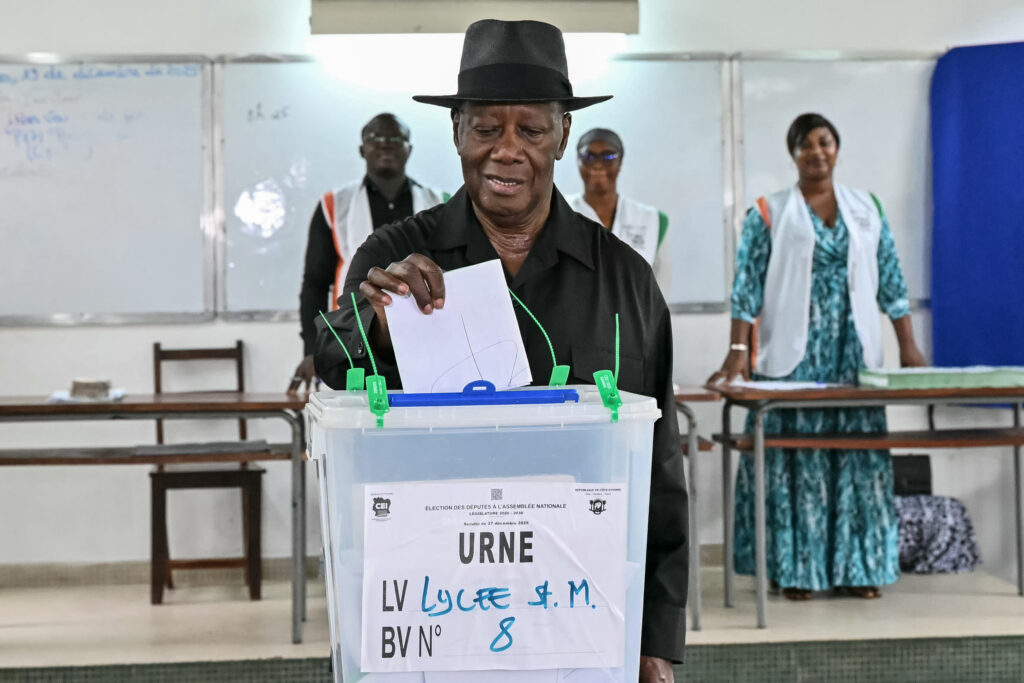Zelensky soutenu par les Européens et le Canada avant sa rencontre avec Trump
Le président ukrainien Volodymyr Zelensky, qui a fait escale samedi dans la ville canadienne d’Halifax sur la route de la Floride, a reçu le soutien appuyé des Européens et du Canada à la veille d’une rencontre cruciale avec Donald Trump.Dans la nuit de vendredi à samedi, peu avant le voyage du président ukrainien, des frappes russes massives ont visé la capitale Kiev et sa région, faisant deux morts, une quarantaine de blessés et laissant plus d’un million de foyers sans électricité.Ces nouveaux bombardements montrent que la Russie “ne veut pas mettre fin à la guerre”, s’est emporté M. Zelensky.Plus tard, au cours d’une visioconférence entre le chef de l’Etat ukrainien et les principaux dirigeants européens, le président français Emmanuel Macron a de son côté souligné que ces attaques illustraient “le contraste entre la disposition de l’Ukraine à bâtir une paix et durable et la détermination de la Russie à prolonger la guerre qu’elle a déclenchée il y a près de quatre ans”.Les pays européens, le Canada, l’UE et l’Otan ont à cette occasion assuré M. Zelensky de “leur plein soutien” avant ses discussions prévues pour le lendemain avec le président américain, a déclaré le chancelier allemand Friedrich Merz.Ce dernier a affirmé que les efforts des Européens et du Canada en vue d'”une paix durable et juste en Ukraine” se feraient “en étroite coordination avec les États-Unis”.- L'”intégrité territoriale de l’Ukraine” -“Nous saluons tous les efforts qui mènent à notre objectif commun : une paix juste et durable qui préserve la souveraineté et l’intégrité territoriale de l’Ukraine”, a renchéri la présidente de la Commission européenne, Ursula von der Leyen.Le Premier ministre canadien Mark Carney a quant à lui insisté, en recevant M. Zelensky en Nouvelle-Ecosse, sur le fait que toute “paix juste et durable” en Ukraine ne pourrait être établie qu’avec “une Russie prête à coopérer”.”Nous devons mettre fin à cette guerre, et pour cela, nous avons besoin de deux choses : exercer une pression sur la Russie et apporter un soutien suffisamment fort à l’Ukraine”, a pour sa part plaidé le président ukrainien.Volodymyr Zelensky doit s’entretenir avec M. Trump à propos des “questions sensibles” que sont le sort du bassin minier du Donbass, dans l’est de l’Ukraine, et les garanties de sécurité occidentales pour Kiev, dans le cadre des négociations sur la plan américain destiné à mettre fin au conflit.Et ce après que, dans la nuit de vendredi à samedi, la capitale ukrainienne et ses environs ont été la cible d’au moins 519 drones et 40 missiles, dont respectivement 474 et 29 ont été neutralisés, selon l’armée de l’air. Ces frappes, comme les précédentes, ont visé des infrastructures énergétiques.Conséquence, a déploré la compagnie d’électricité DTEK, plus d’un million de foyers ont été privés de courant.Le ministère russe de la Défense a dans le même temps fait savoir que plus de 230 drones ukrainiens avaient été abattus samedi au-dessus de la Russie.L’armée russe, qui a accéléré ses avancées sur le front ces derniers mois, a par ailleurs revendiqué la prise de la ville de Myrnograd, dans l’oblast de Donetsk (est), et de celle de Gouliaïpolé, dans la région de Zaporijjia (sud).- “Je pense que ça se passera bien” -Volodymyr Zelensky et Donald Trump évoqueront en Floride le plan américain, présenté par Washington il y a près d’un mois. Le président ukrainien a dévoilé cette semaine la nouvelle mouture de ce document, retravaillé après d’âpres négociations avec Kiev.Cette nouvelle version propose un gel du front sur les positions actuelles sans offrir de solution immédiate face aux revendications territoriales de la Russie, qui contrôle environ 19% de l’Ukraine.Le nouveau document abandonne deux exigences clés du Kremlin : un retrait des troupes ukrainiennes de la région de Donetsk et un engagement de l’Ukraine juridiquement contraignant de non-adhésion à l’Otan.Dans ces conditions, la validation de cet accord par Moscou paraît improbable. Le vice-ministre russe des Affaires étrangères, Sergueï Riabkov, a ainsi accusé vendredi Kiev et ses alliés européens de vouloir “torpiller” les négociations et appelé à revenir aux ententes antérieures, faute de quoi “aucun accord ne pourra être conclu”.”Si les autorités de Kiev ne souhaitent pas régler cette affaire pacifiquement, nous résoudrons tous les problèmes qui se posent à nous par la voie militaire”, a quant à lui mis en garde Vladimir Poutine samedi.Volodymyr Zelensky “n’a rien tant que je ne donne pas mon accord”, avait de son côté averti la veille Donald Trump. “Je pense que ça se passera bien avec lui. Je pense que ça se passera bien avec (le chef de l’Etat russe Vladimir) Poutine”, avec lequel il prévoit de s’entretenir “bientôt”, avait-il lancé.
Osimhen stars as Nigeria survive Tunisia rally to reach second roundSat, 27 Dec 2025 22:12:45 GMT
Victor Osimhen starred as Nigeria became the second qualifiers for the Africa Cup of Nations knockout stage after Egypt by surviving a late Tunisia onslaught to win 3-2 in Fes on Saturday. The Super Eagles were cruising to victory when leading 3-0 through goals from Osimhen, captain Wilfred Ndidi and Ademola Lookman.But Tunisia refused to …
Ivory Coast president seeks parliament majority in electionSat, 27 Dec 2025 21:01:29 GMT
Voting ended Saturday in Ivory Coast’s parliamentary elections, a vote marked by poor turn-out in Abidjan following a boycott call by opposition parties and a few scuffles.The election comes two months after 83-year-old Alassane Ouattara won a presidential ballot that extended his 14-year rule.In the Yopougon and Plateau districts of the city, fewer than 100 …
Ivory Coast president seeks parliament majority in electionSat, 27 Dec 2025 21:01:29 GMT Read More »
La Thaïlande et le Cambodge concluent une trêve
La Thaïlande et le Cambodge ont conclu samedi un cessez-le-feu immédiat dans leur conflit frontalier qui a fait en trois semaines au moins 47 morts et près d’un million de déplacés.Dans une déclaration on conjointe signée par les ministres de la Défense des deux pays, les deux parties ont annoncé l’entrée en vigueur de la …




